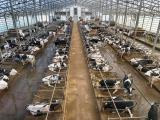Mar 9, 2004 (CIDRAP News) – An avian influenza outbreak on a commercial poultry farm in eastern Maryland was confirmed over the weekend by the US Department of Agriculture's National Veterinary Services Laboratory in Ames, Iowa, jump-starting quarantines, culling, and widespread testing. The strain identified, H7, is the same one that infected two flocks in Delaware in February, but so far there is no evidence connecting the Maryland and Delaware outbreaks, according to a Mar 6 news release from the Maryland Department of Agriculture (MDA). The Maryland farm is about 45 miles from the most recently infected farm in Delaware.
The Maryland outbreak was discovered through surveillance efforts instituted in response to the cases in Delaware. The farm was immediately placed under quarantine and the 118,000-bird flock destroyed. It was also decided that the 210,000-bird flock on a farm 1 mile away under the same ownership would also be culled as a precaution, and a third farm with the same owner, this one 2 miles away, was placed under close observation. Sampling was started at the 171 poultry farms within a 6-mile radius of the index farm.
An MDA news release yesterday reported that the first round of test results, from farms within an 8-mile radius of the affected farm, are negative. "This is an encouraging start to our efforts to find any and all possible avian influenza–positive flocks, said Maryland Secretary of Agriculture Lewis R. Riley. The negative results include the close-by farm where it was decided that culling was appropriate, and this plan will proceed.
The H7 strain can be devastating to birds but, unlike the H5 strain spreading in Asia, does not pose a risk to humans.
The last avian flu outbreak in Maryland occurred in 1993 among game birds. Poultry farming in Maryland is, as of 2002, a $440,000 business—31% of the state's agriculture industry, according to the MDA release.
Japan: fourth poultry outbreak, plus flu in crows
A fourth outbreak of H5N1 avian influenza in Japan has occurred in the western part of the country. This follows discovery of the infection in three other locations in Japan in January and February.
The company operating the farm where the third outbreak occurred, Asada Nosan, has been accused of delaying reporting of illness among its 250,000-bird flock and continuing to ship live birds and eggs even after chickens began dying there. The chairman of the company, Hajimu Asada, and his wife apparently committed suicide over the situation. A BBC News report says their bodies were found yesterday morning with a note apologizing for the "great deal of inconvenience" they had caused.
Meanwhile, Japan's Farm Ministry reported yesterday that H5 avian flu had been confirmed in two dead crows, one on the Asada Nosan farm and one about 5 miles away. Officials are investigating the route of contagion. It is the first time wild birds other than caged poultry have had confirmed avian flu, according to the Japanese newspaper Asahi Shimbun. This will not be considered a fifth outbreak in Japan because wild birds are not covered by the same regulations as are domestic poultry. A ministry official cautioned that "It is most imperative to prevent wild birds from entering poultry farms."
Thailand: another human case
The Ministry of Public Health in Thailand today confirmed an 11th human case of the H5N1 avian flu strain, according to an update from the World Health Organization (WHO). The patient is a 29-year-old man who did have contact with infected and dead chickens. He became ill in February and was discharged from the hospital Mar 7. This brings the total confirmed human cases in Thailand to 11, with 7 deaths. The only other confirmed human cases have occurred in Vietnam, numbering 22, with 15 deaths.
See also:
Mar 9 WHO update
http://www.who.int/csr/don/2004_03_09/en/
















